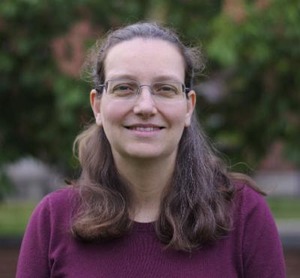Caroline Turner
|
Assistant Professor
Ph.D. 2015, Michigan State University
Microbial experimental evolution; Ecological and evolutionary interactions
Phone: 773.508.3638
Fax: 773.508.3646
E-mail: cturner9@luc.edu
|
RESEARCH INTERESTS
In the Turner Lab we use experimental evolution with bacteria to ask questions about how evolution works and how evolution and ecology interact. The fundamental evolutionary and ecological processes we study have many important applications, such as understanding the dynamics of microbiomes, the evolution of antibiotic resistance, bioremediation, adaptation to environmental change, and more.
Because bacteria grow quickly and have large population sizes, we can observe them evolving in the lab in as little as a few weeks. Genome sequencing also allows us to study the genetic basis of the evolutionary changes we observe. Students in the lab may conduct new evolution experiments or study the outcomes of previous and ongoing evolution experiments, including populations from a more than 30-year long-term evolution experiment with Escherichia coli. There are opportunities in the lab for students interested in doing hands-on work with bacteria and also for students interested in bioinformatics/computational approaches.
Questions we are studying include:
- How repeatable is evolution? i.e. When we evolve the genetically identical bacteria over and over again in the same environment, how similar are the results?
- How does environmental variation affect the repeatability of evolution? How does the repeatability of evolution change over time?
- Under what conditions do initially identical bacteria evolve into multiple types with different ecological niches?
REPRESENTATIVE PUBLICATIONS
Turner, C. B., S. W. Buskirk, K. B. Harris, and V. S. Cooper. 2019. Negative frequency‐dependent selection maintains coexisting genotypes during fluctuating selection. Molecular Ecology 29(1):138-148. DOI: 10.1111/mec.15307
Turner, C.B., C. W. Marshall, and V.S. Cooper. 2018. Parallel genetic adaptation across environments differing in mode of growth or resource availability. Evolution Letters 2(4), 355-367. DOI: 10.1002/evl3.75.
Turner, C.B., B.D. Wade, J.R. Meyer, B.A. Sommerfeld*, R.E. Lenski. 2017. Evolutionary changes in organismal stoichiometry during a long-term experiment with Escherichia coli. Royal Society Open Science 4(7), DOI: 10.1098/rsos.170497.
Lenski, R.E., M.J. Wiser, N. Ribeck, Z.D. Blount, J.R. Nahum, J.J. Morris, L. Zaman, C.B. Turner, B.D. Wade, R. Maddamsetti, A.R. Burmeister, E.J. Baird, J. Bundy, N.A. Grant, K.J. Card, M. Rowles*, K. Weatherspoon, S.E. Papoulis, R. Sullivan, C. Clark, J.S. Mulka, N. Hajela. 2015. Sustained fitness gains and variability in fitness trajectories in the long-term evolution experiment with Escherichia coli. Proceedings of the Royal Society of London B 282(1821), 20152292.
Turner, C.B., Z.D. Blount, and R.E. Lenski. 2015. Replaying evolution to test the cause of extinction of one ecotype in an experimentally evolved population. PLoS ONE 10(11), e0142050.
|
Assistant Professor
Ph.D. 2015, Michigan State University
Microbial experimental evolution; Ecological and evolutionary interactions
Phone: 773.508.3638
Fax: 773.508.3646
E-mail: cturner9@luc.edu
|
RESEARCH INTERESTS
In the Turner Lab we use experimental evolution with bacteria to ask questions about how evolution works and how evolution and ecology interact. The fundamental evolutionary and ecological processes we study have many important applications, such as understanding the dynamics of microbiomes, the evolution of antibiotic resistance, bioremediation, adaptation to environmental change, and more.
Because bacteria grow quickly and have large population sizes, we can observe them evolving in the lab in as little as a few weeks. Genome sequencing also allows us to study the genetic basis of the evolutionary changes we observe. Students in the lab may conduct new evolution experiments or study the outcomes of previous and ongoing evolution experiments, including populations from a more than 30-year long-term evolution experiment with Escherichia coli. There are opportunities in the lab for students interested in doing hands-on work with bacteria and also for students interested in bioinformatics/computational approaches.
Questions we are studying include:
- How repeatable is evolution? i.e. When we evolve the genetically identical bacteria over and over again in the same environment, how similar are the results?
- How does environmental variation affect the repeatability of evolution? How does the repeatability of evolution change over time?
- Under what conditions do initially identical bacteria evolve into multiple types with different ecological niches?
REPRESENTATIVE PUBLICATIONS
Turner, C. B., S. W. Buskirk, K. B. Harris, and V. S. Cooper. 2019. Negative frequency‐dependent selection maintains coexisting genotypes during fluctuating selection. Molecular Ecology 29(1):138-148. DOI: 10.1111/mec.15307
Turner, C.B., C. W. Marshall, and V.S. Cooper. 2018. Parallel genetic adaptation across environments differing in mode of growth or resource availability. Evolution Letters 2(4), 355-367. DOI: 10.1002/evl3.75.
Turner, C.B., B.D. Wade, J.R. Meyer, B.A. Sommerfeld*, R.E. Lenski. 2017. Evolutionary changes in organismal stoichiometry during a long-term experiment with Escherichia coli. Royal Society Open Science 4(7), DOI: 10.1098/rsos.170497.
Lenski, R.E., M.J. Wiser, N. Ribeck, Z.D. Blount, J.R. Nahum, J.J. Morris, L. Zaman, C.B. Turner, B.D. Wade, R. Maddamsetti, A.R. Burmeister, E.J. Baird, J. Bundy, N.A. Grant, K.J. Card, M. Rowles*, K. Weatherspoon, S.E. Papoulis, R. Sullivan, C. Clark, J.S. Mulka, N. Hajela. 2015. Sustained fitness gains and variability in fitness trajectories in the long-term evolution experiment with Escherichia coli. Proceedings of the Royal Society of London B 282(1821), 20152292.
Turner, C.B., Z.D. Blount, and R.E. Lenski. 2015. Replaying evolution to test the cause of extinction of one ecotype in an experimentally evolved population. PLoS ONE 10(11), e0142050.

